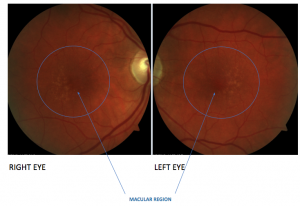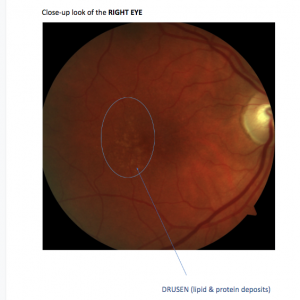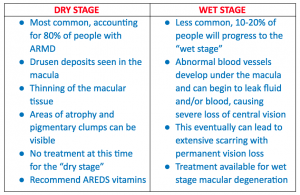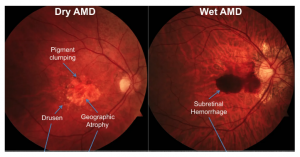Dr. Noskow’s Case Report Age-Related Macular Degeneration
64 Year-old, white, female presents for initial examination with burning, dryness, and itching of both her eyes for many years. Patient states she has a long-standing history of allergies, currently taking Allegra and over-the-counter allergy eye drops. Patient also reports a long-standing history of floaters that are stable and denies any flashes of light in her vision.
Patient denies any history of ocular disease, however, she does have a family history of her mother having Wet Stage- Age-Related Macular Degeneration, receiving intravitreal injections regularly. Patient’s extraocular muscle movements, pupils, and confrontation fields (peripheral vision) are all within normal limits. Vision is 20/20 in the right eye and left eye and intraocular pressure is normotensive.
Upon dilation to view the retina & macula (or back part of the eye), it is clear to see confluent drusen (or accumulated protein/lipid deposits) in the macular region of both eyes (hence the name Macular Degeneration), as seen below.


Age-Related Macular Degeneration (ARMD), is a condition in which there is degeneration and damage to the tissue called the macula, the area which is responsible for giving us our sharp central vision. When this area becomes damaged, one is not able to see fine detail, and images can begin to look distorted. One with Macular Degeneration may find themselves using “Eccentric Viewing” in which they try to use their peripheral vision to view an object, as Macular Degeneration does NOT affect your peripheral vision.
There are two stages of Age-Related Macular Degeneration. The “Wet stage” and the “Dry stage”.


https://www.acms.org/2019/03/age-related-macular-degeneration-in-2019/
The image above shows an example, comparing “Dry AMD” Vs. “Wet AMD”
Risk factors for ARMD are age, family history, Caucasian race, and smoking. One can lower their risk for developing Age-Related Macular Degeneration by eating healthy foods, including leafy green vegetables and fish, quit smoking, and have regular physical activity. It is very important to have yearly dilated eye examinations to ensure monitoring of your ocular health, so that eye conditions such as Macular Degeneration, can be detected early on.
To have your eyes checked for any major ocular diseases, make an appointment with Dr. Noskow. Give our office a call or simply schedule an appointment via ZocDoc.
On social media? Like us on Facebook & Follow us on Instagram
